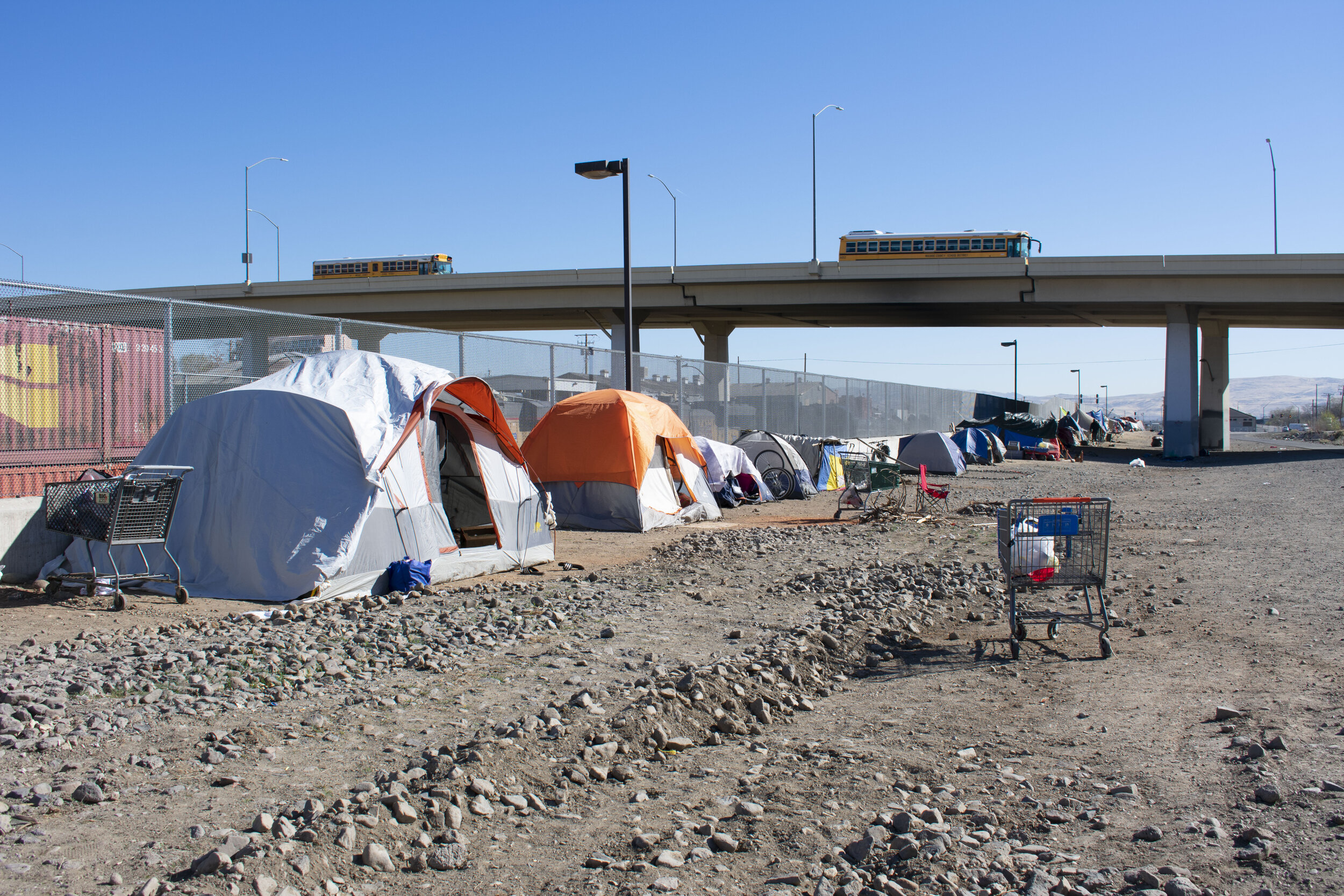A Zoom Meeting to Keep a Long Standing Goal Moving
As coronavirus has created more uncertainty but also new opportunities, activists and advocates for those without shelter are pushing ahead with their goal to establish safe campgrounds in the Reno area.
A petition for a safe camp spearheaded by the group RISE (The Reno Initiative for Shelter and Equality) recently topped 1,000 signatures.
A March 21st meeting initially planned at the Foundation for Recovery in Sparks instead took place via the Zoom video conferencing service.
Representatives from the Foundation for Recovery, QOL-Reno, the Eddy House, Regenesis Reno, One Truckee River, concerned citizens and an English professor voiced their concerns.
“Everyone needs a safe place to re-stabilize and recover from the symptoms causing homelessness,” one participant said on the chat sidebar. “Sobriety and working a program of recovery including mental health treatment are the elements which are going to allow permanent change … in the lives of the unsheltered population. There needs to be services in addition to somewhere to sleep. I believe the community can come together to provide mental health, physical health, and substance use treatment.”
Hazmat crews recently moved mattresses to the Reno Events Center which is the new overnight shelter in Reno during the coronavirus, replacing the Record street campus and the overflow facilities to provide more spacing.
Designated Places Where You Would Be Protected and Not Evicted From
According to the petition, a safe camp is a “legally recognized land area for use by people experiencing homelessness.”
RISE wants local leaders in Reno, Sparks, and Washoe County to provide land where unsheltered residents can live without fear of criminalization, harassment, or eviction and where they could also benefit from the protection of our local law enforcement agencies and help of local services. Ideally, advocates say, there should be several locations throughout the area that are dedicated safe camps.
People would be able to live and sleep there, without fear of displacements. For some, city cleaning efforts should be done with camp residents and not against them. Some would also want the camps to be self-governing as much as possible. On these sites, there could also be bathrooms, trash cans and hand washing stations.
St. Vincent’s is passing out to-go boxes, creating long lines without much social distancing at lunch time. The Reno Initiative for Shelter and Equality (RISE) has been pressuring the City of Reno for houseless individuals to receive hotel vouchers so they can self-quarantine in separate rooms.
Disagreement on ‘Rules’ of Safe Camp
Participants in the Zoom meeting said they wanted to see different mental and physical health care provided, as well as substance use treatment at future safe camps. They also talked back and forth on what the rules of the sites should be, though there wasn’t a clear consensus.
“I think it's about trusting that we are all trying to make things better for our community members who don't have stable housing,” one participant said. “The methods are debatable, but the consistency of our purpose is not. Separating signal from static is so important. It is also about having compassion--caring + wisdom--that is also a kind of trust for those we are working to help.”
Some pointed to what is now a membership based community, Dignity Village, as a possible model to learn from.
Learning from Dignity Village in Portland
Dignity Village started as a safe camp for houseless individuals in Portland, Oregon, in 2000. It is now a tiny home village on land owned by the city of Portland. It provides shelter and community to 60 people who pay $50 per month for utilities. Someone at the meeting suggested that Reno’s safe camp should look to Dignity Village’s five rules, listed below.
No violence to yourself or others.
No theft
No alcohol, illegal drugs, or drug paraphernalia on-site or within a 1-block radius
No constant disruptive behavior
Everyone must contribute to the operation and maintenance of the Village. Everyone must do a minimum of 10 hours “sweat” equity a week.
An official from the Eddy House said the youth who now sleep in their 24-hour facility are given rules and structure as well.
“For awareness, Eddy House currently asks their overnight clients to clean, eat and leave in the morning by 9am. They can stay if they work grave shifts and/or have an appointment with one of our MFTs (therapists). We then open a few hours later. This has to do with helping staff prepare and to make sure the clients don’t get complacent,” the official said.
Other questions were discussed as well. How large should the safe camp be? One idea that was brought up was that there should be multiple, 50 person camps across Reno.
Each camp could be differently catered, like a camp for people who are sober and other ones that are less strict so the camps can meet the needs for people who are in different stages of recovery. Officials from One Truckee River also wanted to know if a safe camp in Reno would decrease people living along the river.
The most disputed rule was if the safe camps should let folks be there during the day or if it should follow what the shelter on Record St. does, and order most people to leave in the morning, only to be able to return at night.
There were no elected officials from the city of Reno or Washoe County taking part in the meeting, even though some have expressed interest in the idea.
RISE was scheduled to present a proposal for a safe camp initiative at the Community Homeless Advisory Board on April 6th but coronavirus now leaves that meeting uncertain, unless it is still held via video conferencing.



